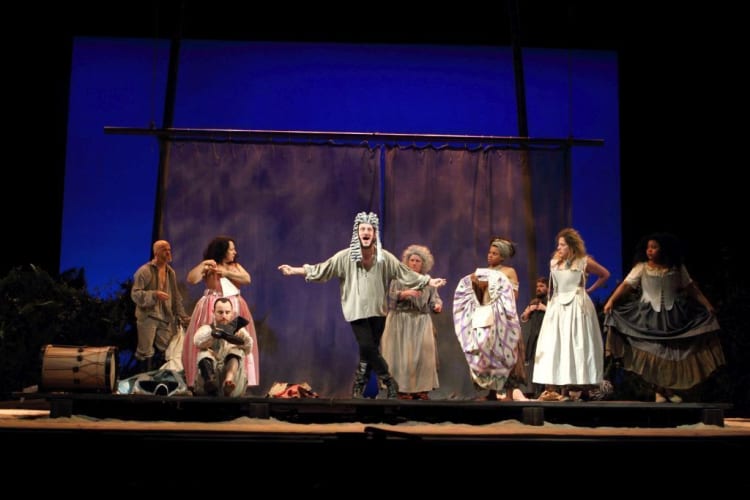Director Fiona Buffini describes Our Country’s Good as "a play about being imprisoned—not just literally in prison, but being constrained by the social order, the way we think about other people and the way we see ourselves." Significantly for this production, "[the play] is very much about escaping from these prisons and using theatre as a tool to do that."
Timberlake Wertenbaker’s play, written in 1998, is a re-working of a Thomas Keneally novel which is itself based on a real historical event, the transportation in 1786 of a large group of convicted British convicts to set up a penal colony in Botany Bay.
The play ranges over a number of significant issues: whether the convicts should be punished or reformed; whether women who had been used as whores on the long journey over were capable of change; the effect on the indigenous inhabitants of seeing their ancestors descend from the sky; and, most importantly, whether taking part in a play could enable the convicts "to learn to articulate their ideas, negotiate, debate, work together in a positive way and support each other."
The play is part of a programme set up by Ramps on the Moon, a consortium of six regional and London theatres with the Graeae Company as a strategic partner who take it in turns to produce a touring show which integrates D/deaf, disabled and non-disabled performers and creative team members.
There is a great deal to thrill and excite in this hugely imaginative production. A strong Brechtian emphasis is evident in the open staging with operatives clearly visible during scene changes, and simple drapes to suggest the sails of a ship, a tent as well as the make-shift curtains for the convicts’ performance.
What is even more effective and symbolically represents the mutual supportiveness that develops between the convict actors in the course of rehearsals is the integration of sign language into the action of the play. So signing is continuously carried out by the actors in turn which means that deaf members of the audience are always included; and the words of non-speaking members of the cast are voiced by speaking actors which reinforces the growing ethos of inclusivity.
There are strong performances by Kieron Jecchinis as the Governor in Chief and Tim Pritchett as director of the convicts’ play, Ralph Clark, in roles that are humane. But equally strong are Will Lewis as Watkin Tench and Colin Connor as Robbie Ross, who are advocates of punishment and brutality. Garry Robson gives a sensitive performance as the conflicted Harry Brewer.
Caroline Parker as Meg Long provides outrageous comedy in the early stages of the play, Fifi Garfield is a powerful presence as Dabby Bryant and Gbemisola Ikumelo’s Liz Morden is strongly characterised.
Sapphire Joy’s Mary Brenham is transformed in the course of the action from a sense of worthlessness to confidence and potential happiness and Emily Rose Salter’s non-verbal performance as Duckling Smith is eloquent in expressive mime.
Every member of this accomplished cast deserves a mention: Tom Dawze as Wisehammer, Alex Nowak as Reverend Johnson, Jarrad Ellis-Thomas and Dave Fishley as the Captains, Keiren Hamilton-Amos as Caesar, Fergus Rattigan as ‘Ketch’ and Milton Lopes as The Aboriginal Australian who is a constant and moving presence reminding us of the iniquity of colonisation.
